MercoPress. South Atlantic News Agency
Argentina
-
Tuesday, October 2nd 2018 - 08:21 UTC
Argentine Peso rises 4% after central bank sells seven-day notes paying 72%
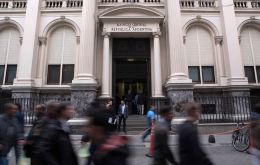
The he Argentine peso climbed more than 4% on Monday trading on the back of a debt sale by the central bank aimed at mopping up excess liquidity and signs that the International Monetary Fund (IMF) is solidly behind the administration of president Mauricio Macri.
-
Tuesday, October 2nd 2018 - 07:37 UTC
Argentine minister and UK ambassador attend play performed by Argentine and British South Atlantic veterans

Argentine foreign minister Jorge Faurie and British Ambassador Mark Kent attended on Sunday evening the San Martin Theatre for the last performance of “Mined Field”, a project written and directed by Lola Arias and which brings together six Argentine and British veterans from the South Atlantic conflict.
-
Monday, October 1st 2018 - 08:56 UTC
Beijing currency swap support for Argentina
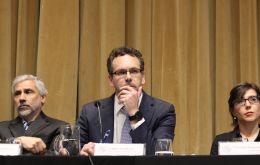
Argentina has “nearly closed” a new currency swap deal with China that will add the equivalent of US$ 9 billion to the South American country’s reserves, the central bank said on Sunday. Argentina and China first agreed to a swap program in 2009 to boost the South American country’s dwindling reserves under former President Cristina Fernandez. Last year, the center-right government of President Mauricio Macri and China agreed to extend the program for three more years.
-
Saturday, September 29th 2018 - 10:38 UTC
Two more Argentine conscripts fallen during the Falklands' conflict have names

The remains of two more Argentine conscripts who lost their lives during the 1982 South Atlantic conflict and are buried at the Argentine military cemetery in the Falkland Islands have been identified, according to the Human Rights Secretariat Office in Buenos Aires. This brings the total number of identified soldiers, previously only marked as “Argentine soldier, only known to God”, to 99.
-
Friday, September 28th 2018 - 20:06 UTC
“Corruption in Argentina surpasses fiction”, and neighboring Uruguay is the “perfect Swiss laundry” for funds

The book topping Argentina's bestseller list is not a thriller or a murder mystery. It’s a crime story of another sort: a blockbuster about political corruption that suggests that bribery is an integral part of the country’s body politic. And neighboring Uruguay is also described as the perfect Swiss laundry for most of the money swindled from Argentina.
-
Friday, September 28th 2018 - 08:58 UTC
Brazilian currency strengthens below 4 to the dollar: first time in five weeks
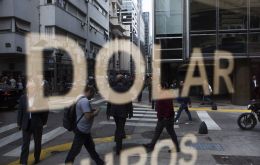
The Brazilian currency dipped under four Real to the dollar for the first time in five weeks at close on Thursday as the markets reacted favorably to the emergence of two clear presidential election frontrunners. The Real closed at 3.99 to the US dollar just two weeks after hitting a record low of almost 4.2 to the dollar -- it's lost around 17% since the start of the year.
-
Friday, September 28th 2018 - 08:07 UTC
Ushuaia looking ahead to a great 2018/19 Antarctica cruise season

Ushuaia, capital of Tierra del Fuego province in the extreme south of Argentina will again be the main hub for Antarctica cruises with an estimated 284 calls involving 36 vessels, according to the provincial Tourism Institute. Overall Ushuaia will receive 375 calls, (Antarctica and non Antarctica cruises) totaling some 120.000 visitors.
-
Friday, September 28th 2018 - 07:55 UTC
President Macri asks for patience; poverty index shows 27,3% Argentines live in poverty
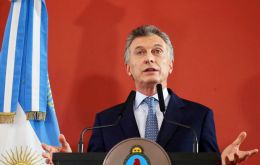
President Mauricio Macri on Thursday asked Argentines for patience in weathering an economic crisis this year and pledged to increase social spending in the coming months, a day after reaching a US$ 57.1 billion deal with the International Monetary Fund.
-
Thursday, September 27th 2018 - 09:19 UTC
Argentine Peso with trading band and zero growth monetary supply policy
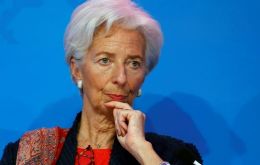
The International Monetary Fund Managing Director Christine Lagarde, speaking at a news conference in New York alongside Argentine Economy Minister Nicolas Dujovne, said IMF was “significantly frontloading” disbursements under the program adding the Argentine central bank had agreed as part of the deal to allow the peso currency to float freely and would only intervene in the foreign exchange market in extreme circumstances.
-
Thursday, September 27th 2018 - 05:45 UTC
IMF and Argentina concord on 36-month US$ 57bn stand-by agreement
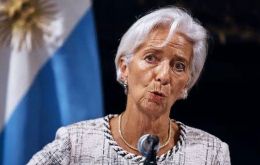
The International Monetary Fund staff and Argentina authorities have reached an agreement on a set of strengthened economic policies that will underpin the 36-month Stand-By Arrangement (SBA) approved on June 20, 2018.
